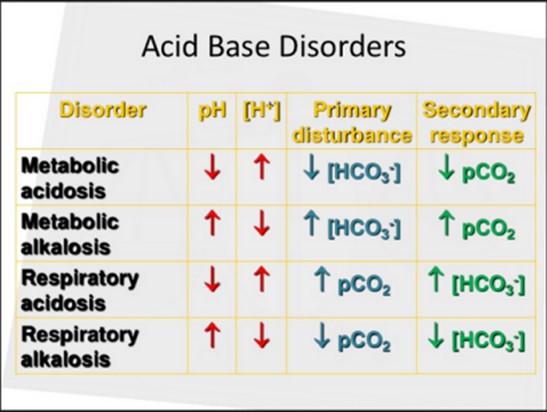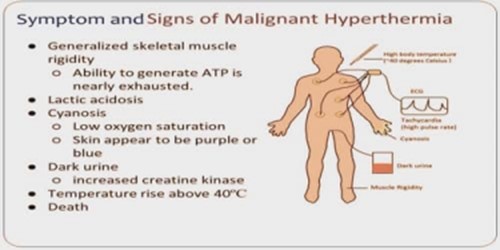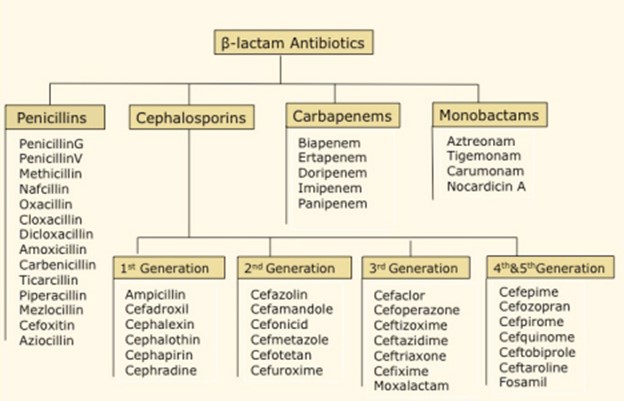Mrs. Kalen is a 70 year old female who has arrived into the ER due to persistent vomiting for two days now. She appears to be lethargic and weak and has myalgia. She is noted to have dry mucus membranes and her capillary refill takes >4 seconds. She is diagnosed as having gastroenteritis and dehydration. Measurement of arterial blood gas shows pH 7.5, PaO2 85 mm Hg, PaCO2 40 mm Hg, and HCO3 34 mmol/L. What would you interpret the acid-base disorder to be?
Uncompensated Respiratory Acidosis
Fully Compensated Metabolic Acidosis
Uncompensated Metabolic Alkalosis
Partially Compensated Respiratory Alkalosis
The Correct Answer is C
The pH value of 7.5 indicates alkalosis, as it is above the normal range of 7.35-7.45. The elevated bicarbonate (HCO3-) level of 34 mmol/L suggests metabolic alkalosis, as it is higher than the normal range of 22-28 mmol/L. The PaCO2 level of 40 mm Hg falls within the normal range of 35-45 mm Hg.
In this case, the primary disturbance is metabolic alkalosis, which is likely caused by vomiting leading to excessive loss of gastric acid (hydrogen ions) and chloride ions from the stomach. This loss of acid and chloride results in an imbalance of electrolytes and an increase in bicarbonate levels, leading to metabolic alkalosis.
The arterial blood gas results do not indicate any compensation. Compensation occurs when the body attempts to restore the pH balance by adjusting the respiratory or metabolic systems. In this case, there is no compensation observed because the PaCO2 level is within the normal range and not significantly altered.

Nursing Test Bank
Naxlex Comprehensive Predictor Exams
Related Questions
Correct Answer is ["A","C","D","F"]
Explanation
Muscle rigidity is a hallmark sign of malignant hyperthermia. It commonly affects the muscles of the jaw and upper chest.
Malignant hyperthermia can lead to rapid and shallow breathing, resulting in tachypnea. Malignant hyperthermia is characterized by a significant increase in body temperature, often exceeding 38.8°C (101.8°F).
Malignant hyperthermia can cause irregular heart rhythms or dysrhythmias, including tachycardia or arrhythmias.
The manifestations of hypertension and skin mottling are not typically associated with malignant hyperthermia. Hypertension (high blood pressure) is more commonly seen in conditions such as hypertensive emergencies or certain cardiovascular disorders. Skin mottling, which refers to irregular or patchy skin coloration, is not a specific manifestation of malignant hyperthermia.

Correct Answer is D
Explanation
Cephalosporins are similar to another group of beta-lactam antibiotics called the Penicillins. Both cephalosporins and penicillins belong to the beta-lactam class of antibiotics, which share a similar structure and mechanism of action. They inhibit bacterial cell wall synthesis by binding to specific proteins called penicillin-binding proteins (PBPs), leading to bacterial cell death. This shared mechanism of action makes cephalosporins and penicillins similar in their antibacterial effects.
On the other hand, macrolides, fluoroquinolones, and aminoglycosides are different classes of antibiotics with distinct structures and mechanisms of action. They work through different mechanisms to inhibit bacterial growth and have different spectrums of activity compared to beta-lactam antibiotics like cephalosporins and penicillins.

Whether you are a student looking to ace your exams or a practicing nurse seeking to enhance your expertise , our nursing education contents will empower you with the confidence and competence to make a difference in the lives of patients and become a respected leader in the healthcare field.
Visit Naxlex, invest in your future and unlock endless possibilities with our unparalleled nursing education contents today
Report Wrong Answer on the Current Question
Do you disagree with the answer? If yes, what is your expected answer? Explain.
Kindly be descriptive with the issue you are facing.
